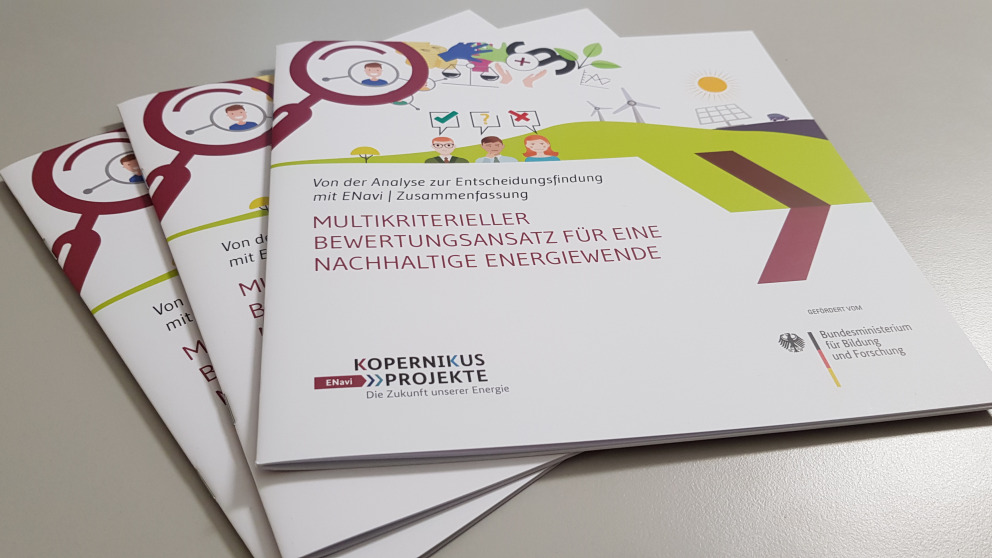A Sustainable Energy Transition: New Guidelines for Multi-Criteria Evaluation
21.02.2019
Transforming Germany’s large power grid into a sustainable energy system is both a challenge and an opportunity. To succeed in this task, we need criteria that define sustainability and reflect society’s values and priorities. A research team in the Kopernikus Project “Energy Transition Navigation System | ENavi” has now developed a set of criteria that integrates a diverse range of perspectives.

The individual criteria are clearly explained in the Brochure “Multi-Criteria Evaluation for a Sustainable Energy Transition: From Analysis to Decision-Making with ENavi” (in German only). These user-friendly guidelines provide a solid foundation for energy policy discussions. Published in August 2018, the longer Project Report presents the multi-criteria evaluation approach in greater detail and also elaborates on individual sub-criteria.
“The fact that these criteria were developed through cooperation between actors from science and society makes them unique. This also creates common ground for the societal debate on Germany’s Energiewende,” explains Dr Rainer Quitzow, an ENavi researcher at the Institute for Advanced Sustainability Studies. The set of criteria reflects ENavi’s transdisciplinary approach to research, where stakeholders from different parts of society are actively involved in the research process.
The transformation of the energy system is inconceivable without political interventions. But each of those interventions will have new and often unforeseen effects. Identifying these effects early on and assessing their scale is one of the main aims of the ENavi project. The set of criteria will make it easier to identify the possible benefits and drawbacks of different energy and climate policy measures and compare proposed courses of action. In this way, trade-offs and alternative options can be pinpointed at an early stage.
The evaluation criteria are oriented on the German Government’s climate and energy transition targets. Divided into three groups, ten criteria highlight the many different aspects of life covered by sustainability:
- Central goals that reflect the classic “target triangle” of energy and climate policy (effectiveness, cost efficiency, total costs, and resilience as a more broadly defined form of security of supply);
- Areas that are also affected by energy and climate policy, where the consequences are, however, usually interpreted as “side effects” of this policy (economic predictability and contribution to the common good, health and environmental protection and resource conservation, fostering social cohesion);
- Criteria where the compatibility of measures with legal, political, and ethical norms and values is being investigated (legitimacy, ethical acceptability, legality).
Funded by the Federal Ministry of Education and Research since 2016, the Energy Transition Navigation System | ENavi is one of four Kopernikus Projects tasked with conducting research on the German Energiewende. The ENavi project approaches the energy transition as a process of broad societal change and links scientific analyses to political and social requirements.
Further information:
- Dr Rainer Quitzow, IASS, explains what multi-criteria evaluation entails: https://youtu.be/n2xI6CKi8zw
- More information on the Kopernikus Project ENavi: https://www.kopernikus-projekte.de/en/projects/system-integration
- Project Report: “Multikriterieller Bewertungsansatz für eine nachhaltige Energiewende: Von der Analyse zur Entscheidungsfindung mit ENavi” (long version): http://publications.iass-potsdam.de/pubman/item/escidoc:3458890
- Guidelines: “Multikriterieller Bewertungsansatz für eine nachhaltige Energiewende: Von der Analyse zur Entscheidungsfindung mit ENavi” (short version): http://publications.iass-potsdam.de/pubman/item/escidoc:3942914
